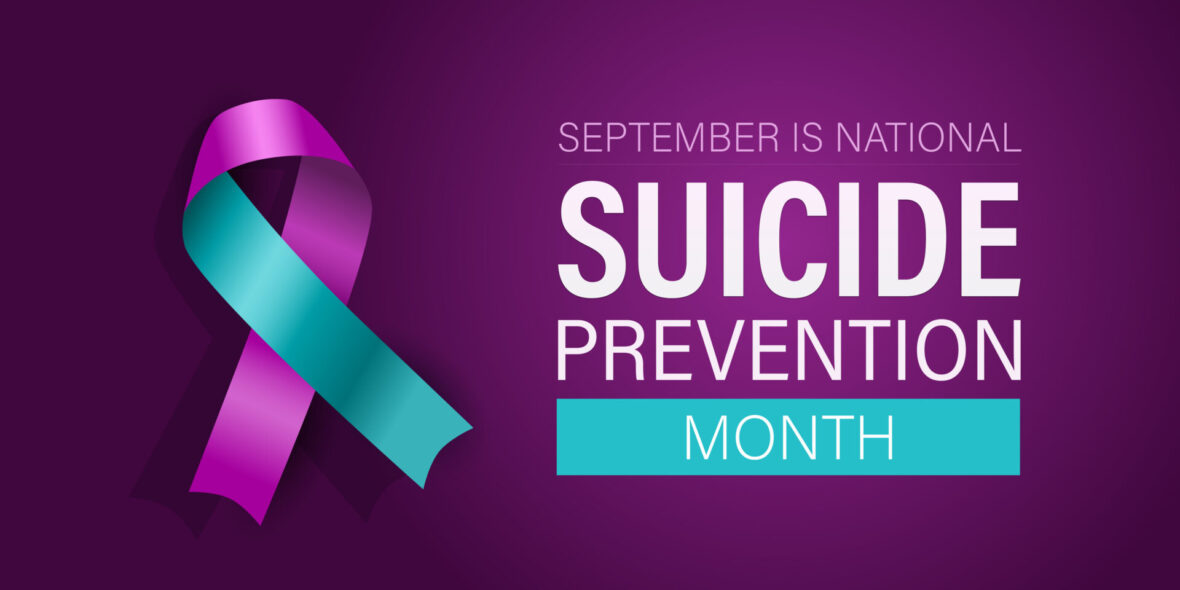Suicide Prevention Month: Raising Awareness and Understanding

September is National Suicide Prevention Month.
According to the National Institute of Mental Health, more than 48,100 people die by suicide each year in the United States. In fact, it is the 11th leading cause of death overall.
“All of us will have a time — even if it’s just for a moment — where we don’t want to be here anymore,” said Liz Davison, Wellpoint Care Network Clinical Supervisor and Therapist. “It happens to everyone. For some of us, it’s just a fleeting thought. But for others, it’s a longer process and suicide may seem like a viable option. But it’s a normal part of the human experience.”
One way to help lower the number of suicides each year is to remove the stigma around mental health and asking for help.
“People often get the message that having a suicidal thought is wrong or bad, and it isn’t,” said Davison. “We have to change the conversation. Suicidal thoughts are a way our system communicates distress to us. It doesn’t mean that you are weak or a bad person. It just means you need to do something to take care of yourself.’
Know The risk factors
Suicide doesn’t have an age, gender or race. It is something that anybody can struggle with at any time — from children to the elderly. But, there are certain segments of the population that are at an increased risk.
- Men are more likely to die by suicide than women. Older men (age 75+) are at the highest risk by far (42.2 per 100,000).
- Race and Ethnicity. American Indian and Alaskan Natives are at a severe risk (43.4 per 100,000), followed by non-Hispanic Whites (30 per 100,000) and Blacks (14.8 per 100,000).
- LGBTQ+ youth are more than four times as likely to attempt suicide than their peers, with more than 1.8 million LGBTQ+ young people (ages 13-24) seriously considering suicide each year in the U.S.
“It’s about feeling trapped in pain,” said Davison. “When there’s a feeling of hopelessness that there’s nothing you can do to make this stop hurting or to make it stop hurting other people that you care about, that’s a huge factor.”
know the warning signs
Suicide is complicated, but it can be preventable. Knowing the common warning signs of suicide can help save lives.
- Making suicidal statements. Saying things like “You’d be better off if I wasn’t here,” “Everyone’s life would be better if I just disappeared” or “I can’t do this anymore” can be a subtle cry for help.
- Increased isolation, shutting down or pulling away from people.
- Loss of interest in hobbies or activities that they normally enjoy.
- Giving away possessions or making a will.
- Seeming hopeless about the future, or powerless to change things.
Something else that can be a warning sign — one that people don’t always expect — is when someone who’s been struggling suddenly seems super happy, cheerful and bright.
“Often, that’s because they’ve made a plan and have decided that they are going to execute that plan,” explains Davison. “They seem better on the outside because they have an end date to the pain and that can be really freeing.”
KNOW THE ACTION STEPS
If you are a friend or family member of someone you think might be at risk for self-harm, there are some action steps you can take.
- Ask. “If you’re concerned about someone, it is okay to ask directly if they are having suicidal thoughts,” said Davison. “If you’re wrong and you misread the situation, then that’s the end of it. But if you’re right, you just made yourself a safe person to share their feelings with, even if they don’t tell you in that moment.”
- Listen. “Don’t try to fix anything right away,” said Davison. “Don’t try to tell them they shouldn’t feel the way they feel. Try to say something along the lines of, ‘That must really hurt,’ and then be present in the moment for them. Knowing they are not alone is a huge step.”
- Get help. “Connect them to someone with more professional experience — perhaps a guidance counselor, a therapist or a member of the clergy if they’re in a faith group,” said Davison. “And if you’re ever unsure about safety, you can always call 911.”
KNOW YOU’RE NOT ALONE
It’s important to remember that suicidal thoughts or mental health issues can occur in anyone. If you are a parent of a child who is struggling, you are not alone — and your diligence can make a world of difference.
“No parent or caregiver ever wants to think their child is struggling,” said Davison. “It can lead to a sense of failure that you somehow let your child down. But having a child who struggles doesn’t mean you’ve failed. The fact that you’ve noticed the struggle is a huge sign that you are doing the best that you can as a parent.”
The best thing you can do as a parent or caregiver is to help the child get through their struggle in a safe way by connecting them to the resources they need.
“Suicidality is not a life sentence,” said Davison. “We have children who struggle with it who go on to never think about it again, and others who struggle with it chronically but have learned how to live with it. So, while it’s hard and scary, it doesn’t define them, and it doesn’t define their future.”
KNOW YOUR TREATMENT OPTIONS
If you or someone you know needs help, Wellpoint Care Network can provide support for a variety of mental health needs. Many of our therapists are being trained in Collaborative Assessment and Management of Suicidality (CAMS), a patient-centered clinical philosophy of care based on empathy, honesty and trust. We’ve also recently partnered with the National Child Traumatic Stress Network on a project that works to educate the community about suicide.
“We have some great therapists on-site in several schools, in Boys and Girls Clubs across Milwaukee and in our Outpatient Mental Health Clinic that all have experience working with clients who struggle with suicidality,” said Davison. “But, the most important thing we can do is to spread awareness of the problem. What are things we can do as a community to support those who are struggling? The more people that know the warning signs and what they can do to help, the better.”
Additional Suicide Prevention Resources:
- 988 Suicide & Crisis Hotline: Now available 24/7 across the United States
- The Trevor Project: Specialized help and counseling for LGBTQ+ youth
- Crisis Text Line: Volunteer Crisis Counselors via text, chat and Whatsapp
- Crisis Resources: For support with abuse, recovery and more








